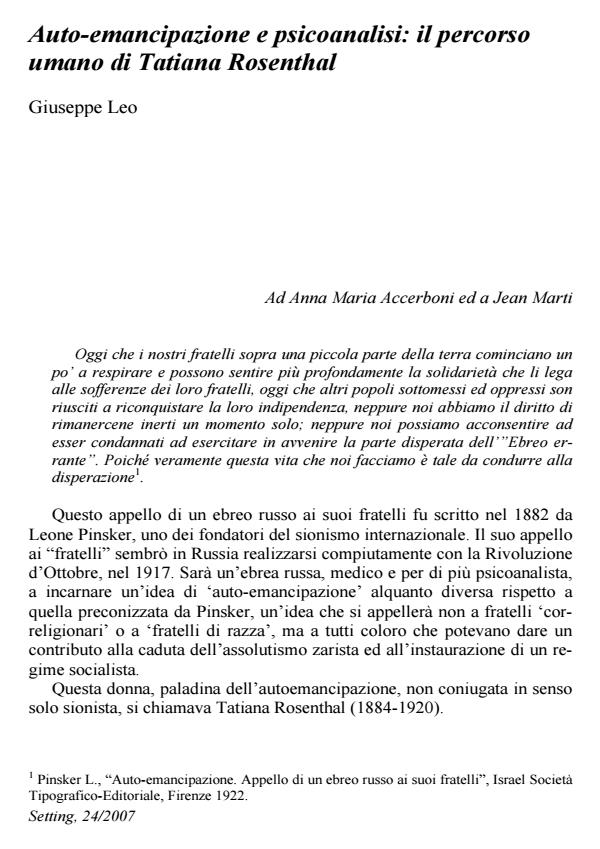Auto-emancipazione e psicoanalisi: il percorso umano di Tatiana Rosenthal
Titolo Rivista SETTING
Autori/Curatori Giuseppe Leo
Anno di pubblicazione 2008 Fascicolo 2007/24
Lingua Italiano Numero pagine 18 P. 99-116 Dimensione file 76 KB
DOI
Il DOI è il codice a barre della proprietà intellettuale: per saperne di più
clicca qui
Qui sotto puoi vedere in anteprima la prima pagina di questo articolo.
Se questo articolo ti interessa, lo puoi acquistare (e scaricare in formato pdf) seguendo le facili indicazioni per acquistare il download credit. Acquista Download Credits per scaricare questo Articolo in formato PDF

FrancoAngeli è membro della Publishers International Linking Association, Inc (PILA)associazione indipendente e non profit per facilitare (attraverso i servizi tecnologici implementati da CrossRef.org) l’accesso degli studiosi ai contenuti digitali nelle pubblicazioni professionali e scientifiche
Auto-emancipazione e psicoanalisi: il percorso umano di Tatiana Rosenthal The article points out Tatiana Rosenthal’s deep and tragic life, a Russian psychoanalyst trained in Zurich who lived between 1884 and 1920, that has been shrouded in mystery up to now. She took a great interest into the application of psychoanalysis to literature, confuting Freud’s singleness of sexual genesis stating that the problem of the artistic creation cannot be reduced to a matter of unconscious conflicts. At its core we would find the humiliation experience and the struggle for the diametrically opposite one’s own supremacy, connected to the aggressive tendency in Adler’s work. Her mot famous paper was published in 1911 and consisted of a psychoanalytic reading of one of the Danish writer Karin Michaelis’ most famous novels. We have only one of Tatiana Rosenthal’s other papers: Dostojevskij’s suffering and creating: A psychogenetic analysis(1920), translated into Italian in Giornale storico di Psicologia dinamica The author summarizes and illustrates critically this almost unknown pioneer and woman’s figure, through a very documented and partially new reconstruction, up to the tragic end of her life, due to a suicide and to the underlying depressive mood.
Giuseppe Leo, Auto-emancipazione e psicoanalisi: il percorso umano di Tatiana Rosenthal in "SETTING" 24/2007, pp 99-116, DOI: